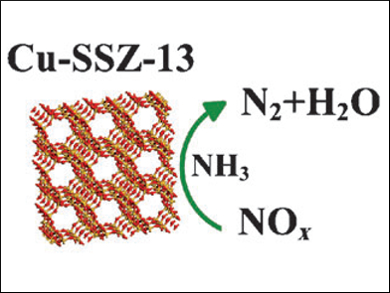The metal-exchanged zeolite SSZ-13 has important applications, including the ammonia selective catalytic reduction (NH3-SCR) to reduce NOx emissions from diesel engines, the methanol-to-olefins reaction, and the direct conversion of ethylene to propylene. However, two major bottlenecks obstructing its wider application are the long synthesis time needed to obtain high-quality SSZ-13 and its thermodynamically metastable nature.
Tatsuya Okubo and colleagues at the University of Tokyo and Mitsubishi Chemical Group, Yokohama, Japan, used fast heating in a tubular reactor to avoid thermal lag, addition of an SSZ-13 seed to promote formation of the desired zeolite phase, and the appropriate choice of aluminum source to establish an ultrafast synthesis of SSZ-13. High-quality SSZ-13 could be obtained in ten minutes, compared to the several days typically required, allowing a continuous-flow reactor to be developed.
After copper-ion exchange, the researchers examined the performance of the fast-synthesized SSZ-13 in the removal of nitrogen oxides through the NH3-SCR, and found it to exhibit comparable catalytic performance to the zeolite synthesized by standard techniques.
- Widening Synthesis Bottlenecks: Realization of Ultrafast and Continuous-Flow Synthesis of High-Silica Zeolite SSZ-13 for NOx Removal,
Zhendong Liu, Toru Wakihara, Kazunori Oshima, Daisuke Nishioka, Yuusuke Hotta, Shanmugam P. Elangovan, Yutaka Yanaba, Takeshi Yoshikawa, Watcharop Chaikittisilp, Takeshi Matsuo, Takahiko Takewaki, and Tatsuya Okubo,
Angew. Chem. Int. Ed. 2015.
DOI: 10.1002/anie.201501160
|
The fastest synthesis of a zeolite (10 min) was reported for the high-silica zeolite SSZ-13, using a tubular reactor, addition of an SSZ-13 seed, appropriate choice of aluminum source, and high temperature. |

 Find more world records from all branches of chemistry on the Records and Challenges platform of
Find more world records from all branches of chemistry on the Records and Challenges platform of 

